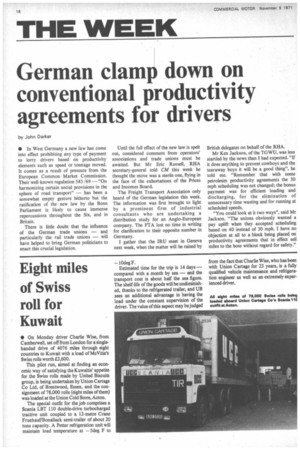German clamp down on conventional productivity agreements for drivers
Page 20

If you've noticed an error in this article please click here to report it so we can fix it.
by John Darker • In West Germany a new law has come into effect prohibiting any type of payment to lorry drivers based on productivity elements such as speed or tonnage moved. It comes as a result of pressure from the European Common Market Commission. Their well-known regulation 543 /69 —"On harmonizing certain social provisions in the sphere of road transport" — has been a somewhat empty gesture hitherto but the ratification of the new law by the Bonn Parliament is likely to cause immense repercussions throughout the Six, and in Britain.
There is little doubt that the influence of the German trade unions — and particularly the rail trade unions — will have helped to bring German politicians to enact this crucial legislation. Until the full effect of the new law is spelt out, considered comment from operators' associations and trade unions must be awaited. But Mr Eric Russell, RHA secretary-general told CM this week he thought the move was a sterile one, flying in the face of the exhortations of the Prices and Incomes Board.
The Freight Transport Association only beard of the German legislation this week. The information was first brought to light by a prominent firm of industrial consultants who are undertaking a distribution study for an Anglo-European company. The ETA lost no time in writing for clarification to their opposite number in Germany.
I gather that the IRU meet in Geneva next week, when the matter will be raised by British delegates on behalf of the RHA.
Mr Ken Jackson, of the TGWU, was less startled by the news than I had expected. "If it does anything to prevent cowboys and the tearaway boys it will be a good thing", he told me. "Remember that with some petroleum productivity agreements the 30 mph scheduling was not changed; the bonus payment was for efficient loading and discharging, for the elimination of unnecessary time wasting and for running at scheduled speeds.
"You could look at it two ways", said Mr Jackson. "The unions obviously wanted a pay uplift when they accepted scheduling based on 40 instead of 30 mph. I have no objection at all to a block being placed on productivity agreements that in effect sell miles to the boss without regard for safety."




































































































































































